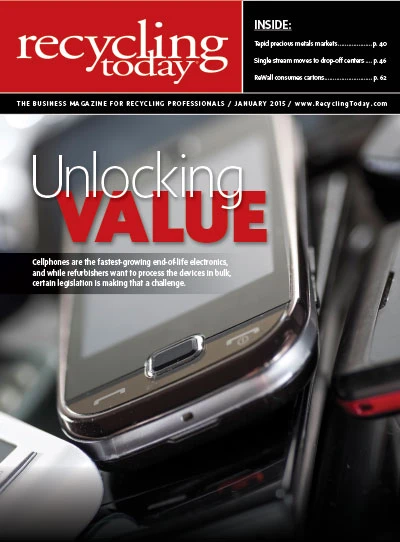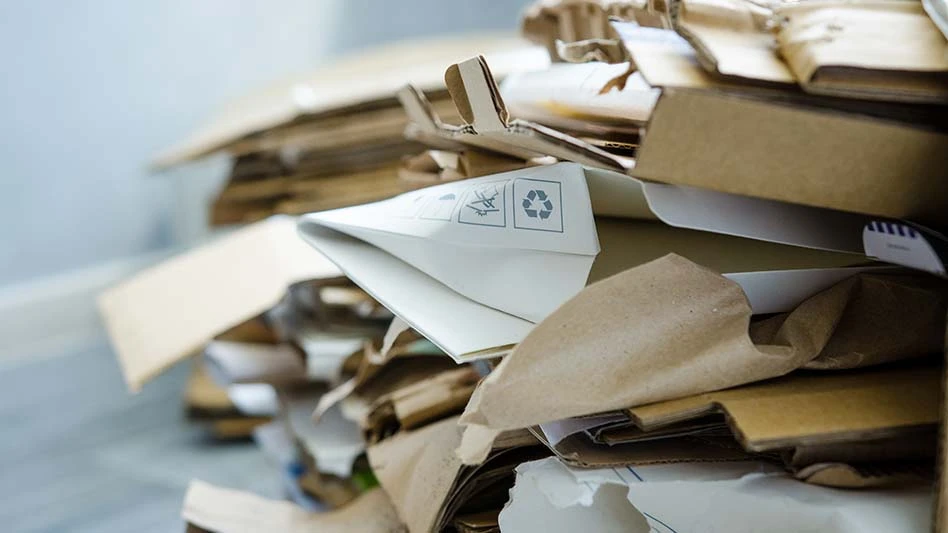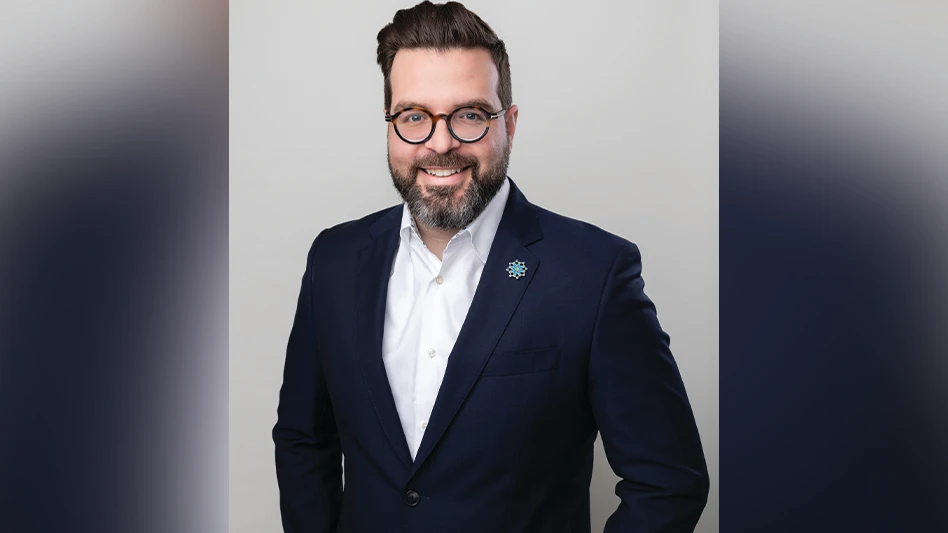 Both the traditional jewelry sector in India and the nation’s younger but burgeoning electronics industry require precious metals, a circumstance that caused trained chemical engineer Peethambaram Parthasarathy to enter into the precious metals coating, recovery and refining industries 30 years ago.
Both the traditional jewelry sector in India and the nation’s younger but burgeoning electronics industry require precious metals, a circumstance that caused trained chemical engineer Peethambaram Parthasarathy to enter into the precious metals coating, recovery and refining industries 30 years ago.
As office and household electronics became more widespread in India — including end-of-life units — an opportunity to harvest the precious metals from this material stream became clear to Parthasarathy, who founded E-Parisaraa Pvt. Ltd. in Bangalore in 2004.
Ten years after founding the company, Parthasarathy has brought his son Hari onto the leadership team of a firm that now has six facilities located in four different Indian cities with some 180 full-time employees dismantling and processing a diverse stream of end-of-life electronics.
Commodity recovery
The more than 1.2 billion people of India have proven no exception from the rest of the world in their desire to have cell phones, computers, televisions and other types of household electronics.
Likewise, offices and other places of work in India have deployed computing and telecom equipment that is regularly replaced when new and more efficient technology hits the market. The city of Bangalore in the state of Karnataka in southwest India has particularly developed a reputation as the Silicon Valley of India.
While India is now home to vast numbers of cell phones, smart phones, computers and televisions, Parthasarathy also says the average device or appliance enjoys an extended life cycle there.
“Being a developing country, the re-use angle is much more prevalent,” he comments. “People repair, reuse, repair, reuse, etc.” This occurs with cell phones, televisions and office computers, says Parthasarathy.
“When you have an old television you give it to somebody who maybe still has a black and white TV and is getting a color TV,” he comments. Regarding computers, Parthasarathy says, “By the time it’s disposed of, that computer probably has a very old chip that is not re-sellable.”
This culture of re-use means that while E-Parisaraa dismantlers are certainly on the lookout for components with value, the company’s operations must focus heavily on secondary commodities recovery.
As E-Parisaraa has evolved, recovery efforts continue to focus on precious metals but also now include plastics and other metals, most of which have end markets within India itself.
“We are exporting only the circuit boards and the lithium ion batteries,” says Parthasarathy, who adds that a common export destination for these materials are Belgium and Japan. “Everything else can be effectively [consumed] here in India,” he comments.
Parthasarathy says dismantling by hand provides the cleanest streams of material, allowing his facilities to segregate plastics by resin and color into pure streams. The company even dismantles and recovers silver from keyboard circuit films by selective stripping, with the plastics granulated for recycling.
E-Parisaraa does not completely turn away from automation, however, as the company shreds hard drives if customers request it and it uses automated equipment to shred circuit boards and also for wire and cable processing.
| A diverse array The waste and recycling stream in India is as diverse as anywhere else in the world, as reflected by the list of end-of-life objects handled by E-Parisaraa Pvt. Ltd., based in Bangalore, India. Among the items the company buys or accepts are:
|
Operational model
E-Parisaraa got its start in Bangalore, the Indian city with the greatest number of research facilities and corporate campuses for global computer software and hardware companies.
E-Parisaraa’s initial 5,575-square metre (60,000 square feet) multi-level processing location can be found on 1.5 acres of land about 50 kilometres from Bangalore off of an expressway in an industrial area “earmarked for hazardous waste management by the government of Karnataka [state],” according to Parthasarathy.
|
Informal links Recycling rates in India, while difficult to measure, are considered to be high thanks to the millions of individuals scouring discarded materials for metals, plastics and paper, collectively known as India’s “informal network.” Two presenters at the Electronics Recycling Asia event, held in mid-November 2013 in Singapore, commented that India’s future recycling industry is likely to include these millions of scavengers and peddlers, for whom the income brought about by scavenging is crucial. Among the presenters was Peethambaram Parthasarathy, whose Bangalore, India-based company E-Parisaraa Pvt. Ltd. has been working to formalize the local network of obsolete scrap collectors. Parthasarathy estimated that as many as 500,000 people in India collect, buy and sell electronic or plastic scrap in an industry sector that has long been “labour intensive, not capital intensive.” This informal network, however, is providing India with a plastics recycling rate that he estimates at 60 percent—“the highest in the world,” according to Parthasarathy. The company continues to use low-tech resin identification and hand sorting methods and relies in part on traditional scavengers in a larger corporate setting. “The informal sector can be formalized, especially with training,” he stated. Recycling practices such as these may be less automated than in other parts of the world, said Parthasarathy, but that does not make them substandard. “We don’t burn or dump [scrap] in India,” he declared, “and we’re now making components like computer mouses and keyboards from our recycled scrap.” Dr. Lakshmi Raghupathy, former director of India’s Ministry of Environment & Forests, told attendees that while India currently generates less electronic scrap than the United States or China, the nation sells 12.5 million television sets annually and has some 220 million cell phone users, so the amount of electronic scrap is destined to grow. She said an estimated 95% of electronic scrap generated in India goes through the informal sector. “It gives a lot of employment,” Dr. Raghupathy said of this network of unlicensed collectors and accumulators. “We have to have a system that includes them, not replaces them,” she commented. The former director also noted that this informal network has negative aspects that should be changed. She cited pollution and worker safety issues related to practices such as treating some scrap components with acid as “the basic concern.” An eventual solution will require “trust building” between these recyclers and the government, said Dr. Raghupathy, who added that many have expressed resistance to registering with the government. |
After that location was up and running in 2005, Parthasarathy began exploring how to emulate the same model in other cities. Subsequently, E-Parisaraa has set up collection and dismantling facilities in or near Delhi, Mumbai, Chennai and Kolkata.
These plants “will be upgraded to full-fledged recycling facilities over a period of time, depending on the e-scrap materials flow,” he says.
The construction of E-Parisaraa’s business model as a large electronics recycling company in India has involved cooperating with large government agencies and seeking global standardization and auditing reviews while also reaching out to the nation’s vast “informal network” of scavengers and junk collectors.
In Bangalore, E-Parisaraa’s operations have had to seek approval from the Central Pollution Control Board as well as from the Karnataka State Pollution Control Board, Parthasarathy notes.
To fully establish its credentials with multinational OEMs (original equipment manufacturers), E-Parisaraa in 2013 became R2 (Responsible Recycling Practices) certified for “responsible electronic waste recycling and for our integrated management system by Perry Johnson Registrars Inc., based in the U.S.,” he says.
The registration process and subsequent audits have helped develop best practices at the company, Parthasarathy says, but the nature of India’s waste and recycling collection system is such that E-Parisaraa also must engage with the scrap collectors and scavengers who serve India’s residential areas.
“We have been working with [the informal sector] from the beginning,” Parthasarathy says. “I have studied this network and became friends with them. I started networking and working with them. I invite them to lunch, and they invite me. We have a rapport.”
Multiple benefits have resulted from this dialog, he says, such as:
- When informal collectors sell their material to E-Parisaraa, it prevents the material from going to “back yard” recyclers who may use chemicals or small smelters in unsafe and environmentally unsound operations.
- Working in cooperation with government agencies, E-Parisaraa has been able to distribute masks and gloves to collectors to improve their working conditions.
- Access to the material picked up by these scrap collectors, when aggregated to the tens of thousands, helps E-Parisaraa achieve the scale it needs to remain viable.
“At the time when we started this dialog, we were the first in the country and nobody ventured into this business,” says Parthasarathy. (For more on the formal and informal sectors, see the sidebar “Informal Links” on page 22.)
The once unique business model of E-Parisaraa has subsequently been widely emulated in India, says Parthasarathy, providing one of several recent challenges for the company.
Future focused
E-Parisaraa’s first 10 years have included geographic expansion, the addition of materials and services and corporate honours ranging from a Frost & Sullivan Excellence Award for the “Best Entrepreneurial Company of the year 2009” in the waste management services category to a “National Award - 2010 Outstanding Entrepreneurship - First Prize,” awarded by India’s then-president Dr. Mrs. Pratiba Devisingh Patel on behalf of India’s Ministry of MSME (Micro Small and Medium Enterprises).
As the company begins its second decade, Parthasarathy does see competitive threats—but also opportunities.
He says he is glad that E-Parisaraa’s business model has proven to be a winning formula, but it has attracted imitators. In all of its markets, other companies compete for the same end-of-life items that E-Parisaraa seeks.
“Many recyclers in India now compete, and the prices we pay to get the scrap are going up,” says Parthasarathy. “End-of-life profits are being asked for by companies [with obsolete equipment].”
Although he has not always seen signs of it, he is hopeful his certification status can help separate E-Parisaraa. “Others don’t have standards or they are questionable,” says Parthasarathy. “I am not sure if the government will insist on a certain set of standards,” he continues, adding that he is hopeful it will.
The company continues to add to the wide variety of items it will recycle, with E-Parisaraa even conducting a pilot end-of-life vehicle disassembly program. E-Parisaraa also is pushing the boundaries of what it can recover, with a particular focus on rare earth metals, Parthasarathy says.
“We have conducted a small-scale trial to recover tantalum from capacitors,” he says.
Likewise, the company is researching how to recover indium from LCD TV screens and is “thinking about niobium from hard disk magnets,” he says, and researching ways to recover cobalt from lithium ion batteries.
Like many Indians, Parthasarathy is optimistic as of late spring 2014 that the newly-elected national government of Narendra Modi can jump-start the Indian economy. Modi ran in part on his track record of a business-friendly climate in the state of Gujarat that created double-digit GDP growth and could complete infrastructure projects that often hit dead ends in other Indian states.
“We are keeping our fingers crossed and expecting a lot from the [new] government in terms of tax benefits, access to global markets and incentives for companies doing a better job,” says Parthasarathy. “We are looking forward to an improved industrial scenario, including recycling.”
As Parthasarathy’s son Hari, a graduate of Clemson University in the United States, assumes greater responsibilities at E-Parisaraa, he is looking forward to watching how his son can help the company continue to push its boundaries.
“I’m definitely optimistic,” he states. “My son Hari has returned from the U.S. after his studies and has joined my business. After training, he has been made a senior director and can help us expand to other cities.”
Having a father with 30 successful years in the metals plating industry and an electronics recycling startup that quickly become a formidable company in its sector, Hari will have a good role model to emulate.
The author is editor of Recycling Today and can be contacted via email at btaylor@gie.net. A version of this article originally ran in the July/August 2014 issue of Recycling Today Global Edition, a sister publication to Recycling Today.

Explore the January 2015 Issue
Check out more from this issue and find your next story to read.
Latest from Recycling Today
- APR announces Recycling Leadership Award winners
- Glass Half Full opens glass recycling facility in Louisiana
- AmpUp partners with Roundtrip EV
- Global Recycling Day event supports Pittsburgh school's recycling efforts
- President signs executive order on critical minerals
- Registration opens for Scrap Expo 2025
- Toyota opens ‘circular factory’ in UK
- Agilyx works with former Plastic Energy CEO on sourcing venture





